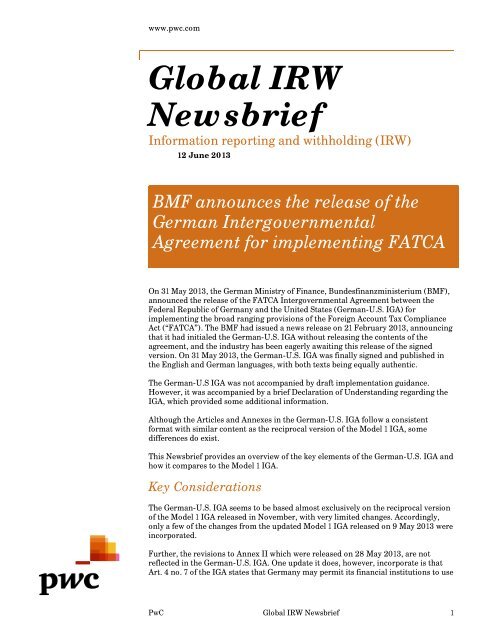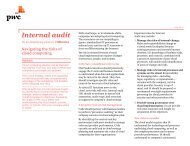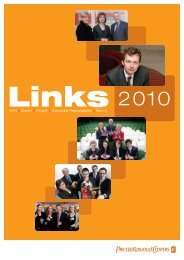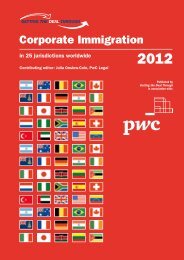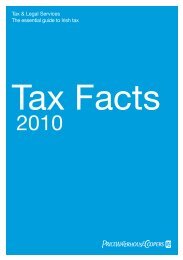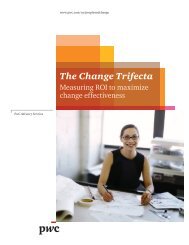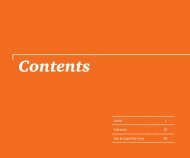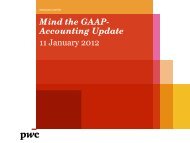Germany signs FATCA intergovernmental agreement with the ... - PwC
Germany signs FATCA intergovernmental agreement with the ... - PwC
Germany signs FATCA intergovernmental agreement with the ... - PwC
- No tags were found...
You also want an ePaper? Increase the reach of your titles
YUMPU automatically turns print PDFs into web optimized ePapers that Google loves.
www.pwc.comGlobal IRWNewsbriefInformation reporting and <strong>with</strong>holding (IRW)12 June 2013BMF announces <strong>the</strong> release of <strong>the</strong>German IntergovernmentalAgreement for implementing <strong>FATCA</strong>On 31 May 2013, <strong>the</strong> German Ministry of Finance, Bundesfinanzministerium (BMF),announced <strong>the</strong> release of <strong>the</strong> <strong>FATCA</strong> Intergovernmental Agreement between <strong>the</strong>Federal Republic of <strong>Germany</strong> and <strong>the</strong> United States (German-U.S. IGA) forimplementing <strong>the</strong> broad ranging provisions of <strong>the</strong> Foreign Account Tax ComplianceAct (“<strong>FATCA</strong>”). The BMF had issued a news release on 21 February 2013, announcingthat it had initialed <strong>the</strong> German-U.S. IGA <strong>with</strong>out releasing <strong>the</strong> contents of <strong>the</strong><strong>agreement</strong>, and <strong>the</strong> industry has been eagerly awaiting this release of <strong>the</strong> signedversion. On 31 May 2013, <strong>the</strong> German-U.S. IGA was finally signed and published in<strong>the</strong> English and German languages, <strong>with</strong> both texts being equally au<strong>the</strong>ntic.The German-U.S IGA was not accompanied by draft implementation guidance.However, it was accompanied by a brief Declaration of Understanding regarding <strong>the</strong>IGA, which provided some additional information.Although <strong>the</strong> Articles and Annexes in <strong>the</strong> German-U.S. IGA follow a consistentformat <strong>with</strong> similar content as <strong>the</strong> reciprocal version of <strong>the</strong> Model 1 IGA, somedifferences do exist.This Newsbrief provides an overview of <strong>the</strong> key elements of <strong>the</strong> German-U.S. IGA andhow it compares to <strong>the</strong> Model 1 IGA.Key ConsiderationsThe German-U.S. IGA seems to be based almost exclusively on <strong>the</strong> reciprocal versionof <strong>the</strong> Model 1 IGA released in November, <strong>with</strong> very limited changes. Accordingly,only a few of <strong>the</strong> changes from <strong>the</strong> updated Model 1 IGA released on 9 May 2013 wereincorporated.Fur<strong>the</strong>r, <strong>the</strong> revisions to Annex II which were released on 28 May 2013, are notreflected in <strong>the</strong> German-U.S. IGA. One update it does, however, incorporate is thatArt. 4 no. 7 of <strong>the</strong> IGA states that <strong>Germany</strong> may permit its financial institutions to use<strong>PwC</strong> Global IRW Newsbrief 1
www.pwc.comdefinitions in relevant U.S. Treasury Regulations in lieu of corresponding definitionsin <strong>the</strong> German-U.S. IGA, “provided that such application would not frustrate <strong>the</strong>purpose of” <strong>the</strong> German-U.S. IGA. Overall, Annex II seems to fall short of industryexpectations, providing a limited number of additional exceptions specific to<strong>Germany</strong>.<strong>PwC</strong> Observation: Given <strong>the</strong> “more favorable terms” clause in <strong>the</strong> German-U.S. IGA, <strong>the</strong> impact of <strong>the</strong> German-U.S. IGA not incorporating many of <strong>the</strong>changes from <strong>the</strong> Model 1 IGA as updated on 9 May 2013, remain to be seen.These changes may subsequently be incorporated into German law as aresult of <strong>the</strong> inclusion of more favorable terms in subsequent IGAs. It shouldbe noted that this clause addresses <strong>the</strong> Federal Republic of <strong>Germany</strong> and not<strong>the</strong> individual institutions <strong>with</strong>in <strong>Germany</strong>. Thus, prior to applying a morefavorable term, details should be included in <strong>the</strong> relevant implementationguidance on how this will function, which is expected in <strong>the</strong> form of a BMFCircular (BMF-Schreiben), and does not constitute an option eligible at <strong>the</strong>level of <strong>the</strong> individual FFI.Fur<strong>the</strong>r, it is thought that U.S. Treasury officials would like to eliminate <strong>the</strong>tailoring of Annex II since <strong>the</strong>y believe <strong>the</strong> final <strong>FATCA</strong> regulations providesufficient clarity on <strong>the</strong> types of institutions, and products which should beexempt or deemed compliant. None<strong>the</strong>less, Annex II still contains languagestating that it may be updated to reflect mutual <strong>agreement</strong> between <strong>the</strong>Competent Authorities in <strong>Germany</strong> and <strong>the</strong> United States “… to includeadditional entities, accounts, and products that present a low risk of beingused by U.S. persons to evade U.S. tax …” though <strong>the</strong> practical application ofsuch provision also remains to be seen.Impact on Scope and ComplianceThe German-U.S. IGA does not provide significant additional clarification relating toscope and compliance. However, <strong>the</strong> Declaration of Understanding provides someclarification related to <strong>the</strong> registration requirements as well as <strong>the</strong> compliance statusfor German financial institutions.Registration ProcessAs <strong>with</strong> all Model 1 IGA jurisdictions, financial institutions resident in <strong>Germany</strong>,including any German branches of non-German financial institutions, will not berequired to enter into FFI Agreements <strong>with</strong> <strong>the</strong> IRS. However, <strong>the</strong> German-U.S. IGAstates that German financial institutions will be required to comply <strong>with</strong> registrationrequirements applicable to financial institutions in IGA jurisdictions.The Declaration of Understanding confirms that <strong>the</strong> current understanding between<strong>Germany</strong> and <strong>the</strong> U.S. is that <strong>the</strong> registration requirements applicable to IGAjurisdiction financial institutions include registering <strong>with</strong> <strong>the</strong> IRS and obtaining aGlobal Intermediary Identification Number (“GIIN”), as each Reporting Germanfinancial institution will use it’s GIIN as <strong>the</strong> identifying number referenced in <strong>the</strong>German-U.S. IGA.<strong>PwC</strong> Observation: With this information, and subject to fur<strong>the</strong>r guidance,it is clear that German Reporting Financial Institutions will be required toregister <strong>with</strong> <strong>the</strong> IRS and obtain a GIIN. It remains, however, unclearwhe<strong>the</strong>r certain deemed-compliant German financial institutions must alsoregister <strong>with</strong> <strong>the</strong> IRS. The declaration does not state whe<strong>the</strong>r institutions or<strong>PwC</strong> Global IRW Newsbrief 2
www.pwc.comentities which are not required to register may do so, even if only to obtain aGIIN in an effort to minimise administrative burdens when sharing <strong>the</strong>ir<strong>with</strong>holding status in <strong>the</strong> market.Registration guidance is expected in <strong>the</strong> coming weeks from <strong>the</strong> IRS.ComplianceArticle 10 of <strong>the</strong> German-U.S. IGA states that <strong>the</strong> <strong>agreement</strong> will go into force once<strong>Germany</strong> has provided written notification to <strong>the</strong> United States that it has completed<strong>the</strong> necessary legislative and internal procedures for <strong>the</strong> <strong>agreement</strong> to be effective.The Declaration of Understanding comments on this point by stating that <strong>the</strong> U.S.intends to treat each German financial institution as compliant <strong>with</strong> <strong>the</strong> German-U.S.IGA, and, thus, not subject to <strong>with</strong>holding during <strong>the</strong> time period when <strong>Germany</strong> ispursuing <strong>the</strong> necessary procedures required for <strong>the</strong> German-U.S. IGA and locallegislation to enter into force, no later than 30 September 2015.Should <strong>the</strong>re be a delay beyond 30 September 2015, for entry into force, anyinformation that should have been reported on 2013 and 2014 accounts in 2015 willbe due on 30 September of <strong>the</strong> year following <strong>the</strong> entry into force.<strong>PwC</strong> Observation: This provision alleviates <strong>the</strong> risk that German financialinstitutions may be treated as non-compliant and subject to <strong>with</strong>holdingbeginning on 1 January 2014, if local guidance is not in place. However, itremains to be seen how this will be applied practically, as it is unclear if <strong>the</strong>IRS will publish a list of all jurisdictions deemed to be compliant, or if <strong>the</strong>GIIN will be <strong>the</strong> primary indicator of compliance for individual financialinstitutions. Alternatively, FFIs may be required to document and proveresidency as well as compliance <strong>with</strong> respect to <strong>the</strong>ir counterpartiesindividually.Financial InstitutionsThough <strong>the</strong> implementation guidance for <strong>the</strong> United Kingdom intends to include <strong>the</strong>definition of investment entity from <strong>the</strong> U.S. Treasury Regulations, <strong>the</strong> German-U.S.IGA made no indication of changing <strong>the</strong> definition, and currently includes <strong>the</strong> samedefinitions for all types of financial institutions, including investment entity, as <strong>the</strong>Model 1 IGA.Annex IIAnnex II, which is customised to identify <strong>the</strong> local entities that present a low risk ofbeing used by U.S. persons to evade U.S. tax, identifies only a limited number oftypes of financial institutions that may qualify as non-reporting German FIs.The German-U.S. IGA provides <strong>the</strong> same categories of exempt beneficial owners as<strong>the</strong> Model 1 IGA (i.e. governmental entities, central banks, internationalorganizations, and certain pension funds) while adding only a few German-specificinstitutions related to <strong>the</strong>se four categories.Under <strong>the</strong> deemed-compliant category, <strong>the</strong> German-U.S. IGA generally retains <strong>the</strong>categories and requirements as provided in <strong>the</strong> Model 1 IGA, namely, financialinstitutions <strong>with</strong> a local client base and certain collective investment vehicles.<strong>PwC</strong> Global IRW Newsbrief 3
www.pwc.com<strong>PwC</strong> Observation: Annex II seems to fall short of industry expectationsand does not contain significant differences to <strong>the</strong> general categoriesprovided in <strong>the</strong> Model 1 IGA for financial institutions that may qualify asnon-reporting German FIs. The industry expected German-specific situationsto have been addressed directly, including <strong>the</strong> treatment of special funds(Spezialfonds), among o<strong>the</strong>rs. The German-U.S. IGA did address contracts<strong>with</strong> a Housing Savings Institution (Bausparkassen), however this type ofspecificity was expected more broadly for <strong>the</strong> German market. The level ofdetail that <strong>the</strong> industry previously expected from <strong>the</strong> German-U.S. IGA willnow be expected in <strong>the</strong> German implementation guidance, namely <strong>the</strong> BMFCircular.Impact on Customer Due Diligence ObligationsThe due diligence procedures on holders of financial accounts and NPFFIs providedin Annex I of <strong>the</strong> German-U.S. IGA does not provide any additional definitions orclarifications from <strong>the</strong> Model 1 IGA, while Annex II does provide some Germanspecificaccounts and products to be excluded from <strong>the</strong> definition of financialaccounts.Due Diligence ProceduresWhile <strong>the</strong> German-U.S. IGA retains <strong>the</strong> provision that <strong>Germany</strong> may allow itsfinancial institutions to rely on <strong>the</strong> due diligence procedures as provided in <strong>the</strong> U.S.Treasury Regulations in lieu of <strong>the</strong> procedures provided in Annex I, it does notcontain <strong>the</strong> additional clarification that was provided in <strong>the</strong> updated version of <strong>the</strong>Model 1 IGA. This provision clarifies that a <strong>FATCA</strong> Partner may permit financialinstitutions to make such election separately for each section of Annex I, and suchelection could be made <strong>with</strong> respect to any clearly identified group of such accounts(such as by line of business or <strong>the</strong> location of where accounts are maintained).Annex II<strong>PwC</strong> Observation: Clarity as to <strong>the</strong> method of applying <strong>the</strong> due diligenceprocedures must now come through <strong>the</strong> BMF Circular. Fur<strong>the</strong>r, additionalguidance on <strong>the</strong> requirements and form of <strong>the</strong> self-certification were eagerlyexpected <strong>with</strong> <strong>the</strong> release of <strong>the</strong> German-U.S. IGA; however, no suchadditional information was provided, and <strong>the</strong> limited guidance related to <strong>the</strong>self-certification remains <strong>the</strong> same as previously provided in <strong>the</strong> Model 1 IGA.Annex II identifies <strong>the</strong> following as categories of accounts and products established in<strong>Germany</strong> and maintained by a German financial institution that shall not beconsidered financial accounts:• Certain retirement accounts/pension schemes meeting specified restrictions• Certain escrow accounts• Contracts <strong>with</strong> certain Housing Savings Institutions<strong>PwC</strong> Observation: Exempting such accounts from <strong>the</strong> scope of <strong>the</strong> IGAresults in <strong>the</strong>se account holders not being subject to customer due diligence by<strong>the</strong> FFI nor are <strong>the</strong>y subject to reporting.<strong>PwC</strong> Global IRW Newsbrief 4
www.pwc.comImpact on Reporting ObligationsUnder <strong>the</strong> German-U.S. IGA, financial institutions located in <strong>Germany</strong>, including anyGerman branches of non-German financial institutions, must obtain and reportaccount holder information annually in a manner similar to what is required under<strong>the</strong> Model 1 IGA. This reporting will be performed through local channels to <strong>the</strong>German Competent Authority, which is identified in <strong>the</strong> German-U.S. IGA as <strong>the</strong>Federal Ministry of Finance or <strong>the</strong> agency to which it has delegated its powers, whowill <strong>the</strong>n exchange <strong>the</strong> information <strong>with</strong> <strong>the</strong> IRS.The initial exchange date of 30 September 2015, has been retained, along <strong>with</strong> <strong>the</strong>requirement that such reporting must include information related to both calendaryears 2013 and 2014.<strong>PwC</strong> Observation: As <strong>with</strong> o<strong>the</strong>r IGAs that have been released, <strong>the</strong>German-U.S. IGA does not provide dates by which German FIs must report to<strong>the</strong> German Authority. We expect <strong>the</strong>se dates to be provided in subsequentGerman BMF Circular. No clarification has been provided around <strong>the</strong> term“payments” <strong>with</strong> respect to <strong>the</strong> transitional reporting to nonparticipatingfinancial institutions. The term used in <strong>the</strong> German version of <strong>the</strong> German-U.S. IGA has a very broad meaning, and could potentially include allpayments, and may not be limited to “income-type” payments. Theexpectation is that additional clarity and confirmation will be provided by <strong>the</strong>BMF in <strong>the</strong> coming weeks as to what types of payments should be included inthis reporting.The German-U.S. IGA and its accompanying Declaration of Understandingboth reference Art. 26 of <strong>the</strong> US / German Treaty Convention for <strong>the</strong>Avoidance of Double Taxation, under which information obtained by <strong>the</strong>respective o<strong>the</strong>r party must, in principle, only be used for tax proceedings. Inparticular, this should preclude <strong>the</strong> IRS from sharing information <strong>with</strong> <strong>the</strong>Securities and Exchange Commission, or o<strong>the</strong>r such regulatory agency, forsupervisory law enforcement against <strong>the</strong> respective financial institutions.None<strong>the</strong>less, given that U.S. law also contains rigid rules <strong>with</strong> respect to <strong>the</strong>giving of advice to U.S. persons (being defined <strong>with</strong> reference to U.S.residency under <strong>the</strong> 1940 Investment Adviser Act / Regulation S), it may, inmany cases, continue to be recommended to review "U.S. clients" and <strong>the</strong>permissibility of existing service offerings to <strong>the</strong>m from various tax, legal andcommercial aspects.Impact on WithholdingThe <strong>with</strong>holding obligations for German financial institutions are <strong>the</strong> same as thoseobligations provided in <strong>the</strong> Model 1 IGA.For financial institutions o<strong>the</strong>r than those identified below, when making<strong>with</strong>holdable payments to nonparticipating FIs, in lieu of <strong>with</strong>holding, <strong>the</strong>y mustprovide information required for <strong>with</strong>holding and reporting to occur directly to anyimmediate payor of such payment.Though <strong>the</strong> German-U.S. IGA expresses <strong>the</strong> commitment of <strong>the</strong> governments tocontinue efforts to develop a practical approach to achieve <strong>the</strong> policy objectives offoreign passthru payments and gross proceeds <strong>with</strong>holding, no additional indicationwas given on how this will be achieved. It does state, however, that prior to 31<strong>PwC</strong> Global IRW Newsbrief 5
www.pwc.comDecember 2016, <strong>the</strong> governments will consult in good faith to amend <strong>the</strong> German-U.S. IGA as necessary to reflect <strong>the</strong> progress on certain commitments made in <strong>the</strong>Agreement, including foreign passthru payments and gross proceeds <strong>with</strong>holding.Financial institutions qualifying as certain <strong>with</strong>holding agents for o<strong>the</strong>r U.S. taxpurposes (i.e. <strong>with</strong>holding qualified intermediaries, <strong>with</strong>holding foreignpartnerships, and <strong>with</strong>holding foreign trusts) will be required to <strong>with</strong>hold 30% onany U.S. source <strong>with</strong>holdable payments paid to any non-participating financialinstitution. What is included in <strong>the</strong> concept of "payments" still requires fur<strong>the</strong>r clarityby <strong>the</strong> Ministry of Finance (see above).<strong>PwC</strong> Observation:It remains unclear as of when and in what format <strong>the</strong> additional reportingobligations in Art. 4 no. 1 e) of <strong>the</strong> IGA become due. In case this would be inline <strong>with</strong> <strong>the</strong> start date for <strong>with</strong>holding (i.e. 1 January 2014) certain reportingobligations will already have to be in place in 2014 and additional guidanceis urgently needed.ConclusionThough <strong>the</strong> guidance provided in <strong>the</strong> German-U.S. IGA may fall short of industryexpectations, <strong>the</strong> Declaration of Understanding that was released does provide somemuch needed clarification related to how financial institutions will be treated if locallaw is not enacted by 1 January 2014. The most immediate requirement from astatutory deadline perspective remains to be registration, <strong>with</strong> <strong>the</strong> Declaration ofUnderstanding confirming that Reporting FIs will be required to register <strong>with</strong> <strong>the</strong>IRS and obtain a GIIN. The question still remains: Will <strong>the</strong> GIIN become an industrystandard for <strong>with</strong>holding purposes, thus driving even those entities <strong>with</strong>out aregistration requirement to want to register?Fur<strong>the</strong>r details addressing remaining issues and areas of uncertainty are nowexpected to be provided in <strong>the</strong> expected BMF Circular. A first draft of suchimplementation guidance is expected in <strong>the</strong> coming months, and subsequent to <strong>the</strong>release of any such guidance, we will be provide fur<strong>the</strong>r analysis in futureNewsbriefs.Additional ReferencesFor more information related to <strong>FATCA</strong>, please visit our website athttp://www.pwc.com/us/fatcaIncluded below are links to <strong>the</strong> Press Release, <strong>the</strong> German-U.S. IGA, and <strong>the</strong>accompanying Declaration of Understanding.Links to Documents in English:• Press Release from <strong>the</strong> German Ministry of Finance• Agreement between <strong>the</strong> Federal Republic of <strong>Germany</strong> and <strong>the</strong> United States ofAmerica to Improve International Tax Compliance and <strong>with</strong> respect to <strong>the</strong>United States Information and Reporting Provisions Commonly Known as <strong>the</strong><strong>PwC</strong> Global IRW Newsbrief 6
www.pwc.comForeign Account Tax Compliance Act• Declaration of Understanding Regarding <strong>the</strong> Agreement between <strong>the</strong> FederalRepublic of <strong>Germany</strong> and <strong>the</strong> United States of America to ImproveInternational Tax Compliance and <strong>with</strong> respect to <strong>the</strong> United StatesInformation and Reporting Provisions Commonly Known as <strong>the</strong> ForeignAccount Tax Compliance ActLinks to Documents in German:• Pressemitteilung• Abkommen zwischen der Bundesrepublik Deutschland und den VereinigtenStaaten von Amerika zur Förderung der Steuerehrlichkeit bei internationalenSachverhalten und hinsichtlich der als Gesetz über die Steuerehrlichkeitbezüglich Auslandskonten bekannten US-amerikanischen Informations- undMeldebestimmungen• Einvernehmenserklärung zum Abkommen zwischen der BundesrepublikDeutschland und den Vereinigten Staaten von Amerika zur Förderung derSteuerehrlichkeit bei internationalen Sachverhalten und hinsichtlich der alsGesetz über die Steuerehrlichkeit bezüglich Auslandskonten bekannten USamerikanischenInformations-und MeldebestimmungenFor more information, please do not hesitate to contact:<strong>PwC</strong> IrelandJohn O’Leary +353 1 792 8569 john.oleary@ie.pwc.comPat Wall +353 1 792 8602 pat.wall@ie.pwc.comEnda Faughnan +353 1 792 6359 enda.faughnan@ie.pwc.comJim McDonnell +353 1 792 6836 jim.mcdonnell@ie.pwc.comYvonne Thompson +353 1 792 7147 yvonne.thompson@ie.pwc.comPat Convery +353 1 792 8687 pat.convery@ie.pwc.comRebecca Maher +353 1 792 8634 rebecca.maher@ie.pwc.comSéamus Kennedy +353 1 792 6840 seamus.kennedy@ie.pwc.comEoin Fallon +353 1 792 5045 eoin.fallon@ie.pwc.com<strong>PwC</strong> <strong>Germany</strong>Dr. Karl Küpper+49 69 9585 5708 karl.kuepper@de.pwc.comAchim Obermann +49 211 981 7358 achim.obermann@de.pwc.comMarkus Zillner+49 89 5790 5205 markus.zillner@de.pwc.comMark D. Orlic+49 69 9585 5038 mark.dinko.orlic@de.pwc.comDr. Oliver von Schweinitz +49 40 6378 2935 oliver.von.schweinitz@de.pwc.comDr. Einiko Franz+49 221 2084 343 einiko.franz@de.pwc.comChristian Auge+49 69 9585 3005 christian.auge@de.pwc.com<strong>PwC</strong> Global IRW Newsbrief 7
www.pwc.comTo view <strong>PwC</strong> <strong>FATCA</strong> contacts in each countryhttp://www.pwc.com/us/en/financial-services/fatca-contacts.jhtml<strong>PwC</strong> Global IRW Newsbrief 8
© 2013 PricewaterhouseCoopers. All rights reserved. <strong>PwC</strong> refers to <strong>the</strong> Irish member firm, and maysometimes refer to <strong>the</strong> <strong>PwC</strong> network. Each member firm is a separate legal entity. Please seewww.pwc.com/structure for fur<strong>the</strong>r details.This content is for general information purposes only, and should not be used as a substitute forconsultation <strong>with</strong> professional advisors.This document was not intended or written to be used, and it cannot be used, for <strong>the</strong> purpose of avoidingU.S. federal, state or local tax penalties. This includes penalties that may apply if <strong>the</strong> transaction that is <strong>the</strong>subject of this document is found to lack economic substance or fails to satisfy any o<strong>the</strong>r similar rule oflaw. This document has been prepared pursuant to an engagement between PricewaterhouseCoopers LLCand its Client and is intended solely for <strong>the</strong> use and benefit of that Client and not for reliance by any o<strong>the</strong>rperson.


